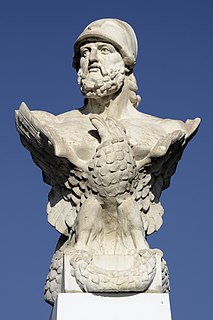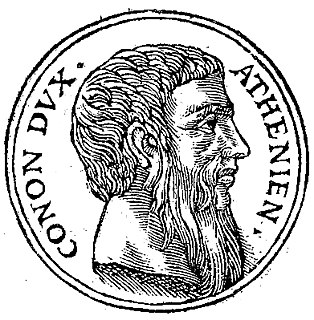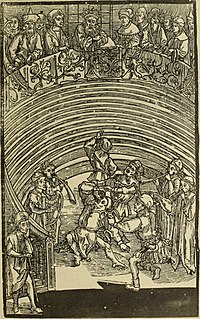 W
WChabrias was an Athenian general active in the first half of the 4th century BC. During his career he was involved in several battles, both on land and sea. The orator Demosthenes described him as one of the most successful commanders Athens ever had:To sum up the whole: he is the only general who never lost a single city or post or ship or soldier, when he commanded you: none of your enemies has any trophy over you and him, while you have many over many enemies under his command.
 W
WCharitimides was an Athenian admiral of the 5th century BCE. At the time of the Wars of the Delian League, a continuing conflict between the Athenian-led Delian League of Greek city-states and the Achaemenid Empire, he was sent in 460 BCE to Egypt in command of a fleet of triremes to support Inaros II, a Libyan ruler who was leading a revolt against the Achaemenid rule over the country. His fleet had been operating on the coasts of Cyprus, from where he was diverted to Egypt.
 W
WCimon or Kimon was an Athenian statesman and general in mid-5th century BC Greece. He was the son of Miltiades, the victor of the Battle of Marathon. Cimon played a key role in creating the powerful Athenian maritime empire following the failure of the Persian invasion of Greece by Xerxes I in 480–479 BC. Cimon became a celebrated military hero and was elected to the rank of strategos after fighting in the Battle of Salamis.
 W
WConon was an Athenian general at the end of the Peloponnesian War, who led the Athenian naval forces when they were defeated by a Peloponnesian fleet in the crucial Battle of Aegospotami; later he contributed significantly to the restoration of Athens' political and military power.
 W
WPhocion was an Athenian statesman and strategos, and the subject of one of Plutarch's Parallel Lives.
 W
WPhormio, the son of Asopius, was an Athenian general and admiral before and during the Peloponnesian War. A talented naval commander, Phormio commanded at several famous Athenian victories in 428 BC, and was honoured after his death with a statue on the acropolis and a state funeral. He is considered one of Athens' many great admirals, alongside Themistocles and Cimon.
 W
WThemistocles was an Athenian politician and general. He was one of a new breed of non-aristocratic politicians who rose to prominence in the early years of the Athenian democracy. As a politician, Themistocles was a populist, having the support of lower-class Athenians, and generally being at odds with the Athenian nobility. Elected archon in 493 BC, he convinced the polis to increase the naval power of Athens, a recurring theme in his political career. During the first Persian invasion of Greece he fought at the Battle of Marathon and was possibly one of the ten Athenian strategoi (generals) in that battle.
 W
WTimotheus was a Greek statesman and general who sought to revive Athenian imperial ambitions by making Athens dominant in a Second Athenian League. He was the son of the Athenian general, Conon. Isocrates considered that Timotheus was superior to the other commanders of his time and showed all the requisites and abilities of a good general.